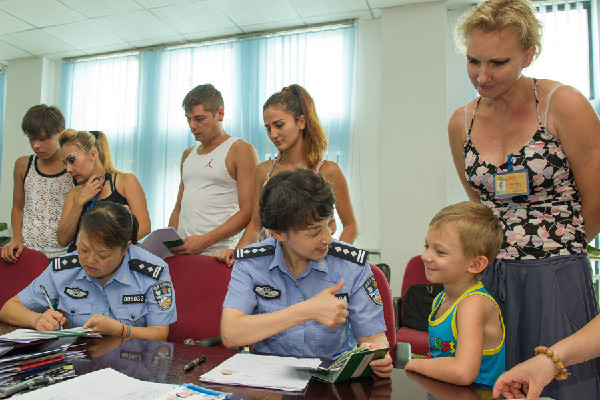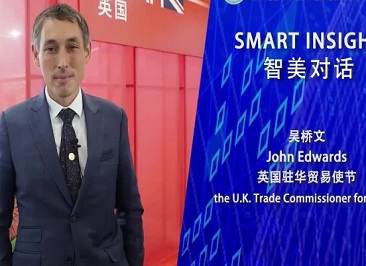Chongqing speeds up permit processing
Tan Yingzi in Chongqing
Updated:2018-06-11
China Daily
 |
|
Officers from the Chongqing Public Security Bureau's Exit-Entry Administration Division serve foreigners at their workplace. [Photo provided to China Daily] |
Design director Steve Won, who is from the United States, asked the exit-entry department in a district of Chongqing to fast track his residence permit application for work on May 10.
Thanks to measures introduced by the municipal Public Security Bureau in March, Won, who works at Chongqing Jinkang New Energy Automobile Design Institute, received his permit six days later.
Police said Won told them he had brought his whole family to the southwestern city from the US and planned to stay in Chongqing for five years. He said he needed his residence permit to claim their household effects from customs and was anxious to get it as soon as possible.
He was lucky he was applying after the Chongqing Public Security Bureau's Exit-Entry Administration Division issued a service guide in March for 14 policies and measures designed to make the municipality a standard-bearer in the opening-up of inland China. As a result, the processing time for a residence permit application by a top foreign professional like Won has been shortened from 15 working days to as few as five.
Chongqing, which has a population of 30 million, became the fourth municipality in China in 1997, following Beijing, Shanghai and Tianjin. It is almost as big as Austria and has long been a hub of industry.
When President Xi Jinping visited Chongqing for an inspection tour in 2016, he said its location at the juncture of the Belt and Road Initiative and the Yangtze River Economic Belt gave it a strategic role in China's go-west campaign and it should become a standard-bearer in inland opening-up as well as a beautiful city with a good natural environment.
Since July, Chongqing police have implemented a series of new measures to better serve foreigners traveling, working, studying and living in the city as Chongqing tries to attract more overseas talent.
"We will provide on-site service for schools and companies that have more than 10 foreigners," said Xu Chunlan from the overseas department of the public security bureau's Exit-Entry Administration Division. "So they don't need to go to our office building to apply for permits now."
This year, Chongqing's Exit-Entry Administration has processed 233 permit applications for foreign teachers and students and conducted 32 on-site interviews.
On March 20, Xu's colleagues provided personalized service for the wife of Yukio Tamura, ex-president of the International Associations for Wind Engineering and an academician of the Japanese Academy of Engineering and now a full-time professor at Chongqing University. A special team was established to help his wife get a permanent residence identity card.
Chongqing police issued 10,850 residence permits to foreign nationals last year, 10.5 percent more than in 2016.
They mainly came from South Korea, the US, Canada, Thailand, Japan, Germany, Singapore, Australia and the United Kingdom, with applications from Canadians and Australians showing the fastest growth.
tanyingzi@chinadaily.com.cn
Video

John Edwards, the UK trade commissioner for China, praised Chongqing over its rise as a burgeoning center in intelligent manufacturing.





